My father taught me sarcasm.
This upset my mother greatly because I’m already a lot like my dad, and then you pile on the quick-wit of sarcastic quips in just the right moment and, well, you piss off a woman whose immediate goal is to find ways to NOT think about her ex.
Plop a kiddo in that household who not only looks like her dad but “sasses” like he did? Oof.
(Note: It’s only called “sassing” if you’re a kid growing up in the south and your mom, aunt, or grandma is pissed that you’ve got a smart mouth.)
I wanna say I was not yet four years old. But I was close.
Daddy was doing something in the garage and I, curious kiddo who loved being included in every activity except for cooking, asked a very typical question: “What are you doing?”
My father’s matter-of-fact answer?
“I’m washing my car.”
(He was NOT washing his car.)
*blink* *blink* *blink*
Now.
I had been Montessori-educated since the age of 2 and that meant that I had been taught to be curious, to ask questions, to seek out things that interested me, and to always be responsible for putting back in its place whatever I got out of its place to explore.
But I had not been taught to understand sarcasm.
“Daddy,” I would say, “You’re not washing your car!”
To which my father would respond, “What am I doing, then?” And I would look, explore, analyze the various tools he was tinkering with and come up with, “Fixing the wheelbarrow!”
And then my father would teach me the lesson: “Then why did you ask what I was doing, if you could see?”
Damn.
Now, there are all the REAL answers: Because I was curious. Because I wanted a shortcut to the answer that would come faster than all that *work* of really being present and observing vs. being told. Because I was a busy, active four-year-old with lots of things to explore and I like efficiency more than just about anything. And most of all, because I love my daddy and want to be included in all things.
Over time, I learned the game.
EVERY time I asked, “What are you doing?” I would be met with, “I’m washing my car.” This answer would come whether my father were brushing his teeth, tying his tie before leaving for Delta, doing his night school trigonometry homework on the huge blackboard in our dining room, or painting my playhouse.
At first, I would get frustrated with his non-answer, but eventually, it became playful.
I would start asking BECAUSE he was going to answer with, “I’m washing my car,” and once he observed that I was in on the game, he started adding a question to his answer.
“Daddy? What are you doing?”
“I’m washing my car. What are YOU doing?”
And at first, I would look around, wondering what he was actually asking, because CLEARLY what I was doing was coming up to him and asking what he was doing… and then I figured out how to play.
“Daddy? What are you doing?”
“I’m washing my car. What are YOU doing?”
“I’m blowing up balloons!”
And soon, I was adding the immediate, “What are YOU doing?” at the end of my answers too, and we were engaged in one of the classic improvisational games I would later learn formally with Atlanta Workshop Players and then TheatreSports (now Impro) in Los Angeles. You pantomime the action that is NOT the answer you give when asked, and the answer you give is the action the asker now has to pantomime while being asked by the next person in the circle the same question. And so on.
It wasn’t until this morning that I remembered the richness of this early lesson. And the memory was so very vivid. It was a string of not only the first moments of frustration over being “lied to” by my father but also the building up of the trust that this “lie” was a joke, a game, a sport… an opportunity to be clever. A chance to be MORE clever, fastest, funniest, FIRST.
The lesson that wit could be sharpened, honed, developed, improved, WORKED OUT, and rewarded with laughter and respect — especially from someone as skilled as my father at “bringing it” — developed something very useful in me at a very young age.
And it all started in a backyard on the southside of Atlanta in the early 1970s.

Bonnie Gillespie is living her dreams by helping others figure out how to live theirs. Wanna work with Bon? Start here. Thanks!
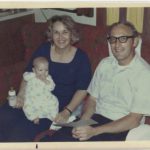
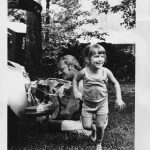

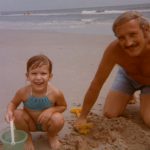

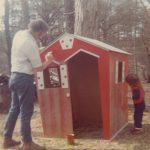

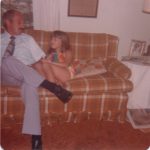



Luv it!!!! What a gr8 way to explain the mechanics of improv to me!! I love your posts over the years, your insight and life experience. You motivate yet tell it like it is. The pictures were awesome. You were an adorably cute kid who grew up to be a gorgeously talented lady~thanks for sharing this. Merry Christmas and a Happy New Year to you and yours!
Really loved this! In addition to being open to the game, I loved the message of being present and seeing what’s in front of you. As an actor, I often feel like a busy, curious four year old too! So important to stop, look and listen in order to truly see what’s in front of us and partake in the joy of the game. I love that instead of getting frustrated with each other, you and your dad played! Such a good life lesson!
Hey Bon! I love this blog! I also REALLY love these images of you and your family! Thank you for sharing these moments and a HELL YES to play!
Lisa — Thank you! 🙂 You are so very sweet with everything you said. I really appreciate it! THANK YOU for reading all this time!
Laura — Yes! Absolutely true. We really do forget to just BE much of the time. I’m sure I was plenty frustrated with my dad until I understood the game. Phew! So glad I stuck with it. This was a really fun memory to have.
Bex — Aw, thank you! It was fun pulling those old photos out and coming up with the order to place them based on what I was sharing in the story. Daddy and I didn’t live together very long, but we sure had a good time while we were together. <3